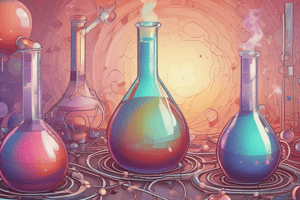Podcast
Questions and Answers
What is the primary difference between a synthesis reaction and a decomposition reaction?
What is the primary difference between a synthesis reaction and a decomposition reaction?
A synthesis reaction involves combining two or more substances to form a new compound, whereas a decomposition reaction involves breaking down a single compound into two or more substances.
What is the purpose of a chemical equation in representing a chemical reaction?
What is the purpose of a chemical equation in representing a chemical reaction?
A chemical equation represents a chemical reaction using chemical formulas and symbols, allowing for a concise and clear representation of the reactants and products.
How does an increase in the concentration of reactants affect the rate of a chemical reaction?
How does an increase in the concentration of reactants affect the rate of a chemical reaction?
An increase in the concentration of reactants can increase the rate of reaction.
What is the role of a catalyst in a chemical reaction?
What is the role of a catalyst in a chemical reaction?
What is the definition of stoichiometry in the context of chemical reactions?
What is the definition of stoichiometry in the context of chemical reactions?
Identify the type of reaction that occurs when a substance reacts with oxygen to produce heat and light.
Identify the type of reaction that occurs when a substance reacts with oxygen to produce heat and light.
What is the term for the substances that undergo a chemical change in a reaction?
What is the term for the substances that undergo a chemical change in a reaction?
How does an increase in the surface area of reactants affect the rate of a chemical reaction?
How does an increase in the surface area of reactants affect the rate of a chemical reaction?
What is the term for the substances formed as a result of a chemical reaction?
What is the term for the substances formed as a result of a chemical reaction?
What is the definition of the rate of reaction in a chemical reaction?
What is the definition of the rate of reaction in a chemical reaction?
Study Notes
Chemical Reactions
Types of Chemical Reactions
- Synthesis Reaction: A reaction where two or more substances combine to form a new compound.
- Example: 2H2 + O2 → 2H2O
- Decomposition Reaction: A reaction where a single compound breaks down into two or more substances.
- Example: 2H2O → 2H2 + O2
- Replacement Reaction: A reaction where one element replaces another element in a compound.
- Example: Zn + CuSO4 → ZnSO4 + Cu
- Combustion Reaction: A reaction where a substance reacts with oxygen to produce heat and light.
- Example: 2CH4 + 3O2 → 2CO2 + 3H2O
Characteristics of Chemical Reactions
- Reactants: The substances that undergo a chemical change.
- Products: The substances formed as a result of a chemical reaction.
- Chemical Equation: A representation of a chemical reaction using chemical formulas and symbols.
- Stoichiometry: The study of the quantitative relationships between reactants and products in a chemical reaction.
Factors Affecting Chemical Reactions
- Concentration: Increasing the concentration of reactants can increase the rate of reaction.
- Temperature: Increasing the temperature can increase the rate of reaction.
- Surface Area: Increasing the surface area of reactants can increase the rate of reaction.
- Catalysts: Substances that speed up a chemical reaction without being consumed or altered.
Chemical Reaction Rates
- Rate of Reaction: The speed at which a chemical reaction occurs.
- Factors Affecting Reaction Rate: Concentration, temperature, surface area, and catalysts.
- Activation Energy: The minimum energy required for a chemical reaction to occur.
Chemical Equilibrium
- Chemical Equilibrium: A state where the rates of forward and reverse reactions are equal.
- Equilibrium Constant: A value that represents the ratio of product concentrations to reactant concentrations at equilibrium.
- Le Chatelier's Principle: A principle that states that a system at equilibrium will respond to changes in concentration, temperature, or pressure to re-establish equilibrium.
Studying That Suits You
Use AI to generate personalized quizzes and flashcards to suit your learning preferences.
Description
Understand the different types of chemical reactions, factors that affect reaction rates, and the concept of chemical equilibrium. Learn about reactants, products, and stoichiometry, and how to apply Le Chatelier's Principle.




